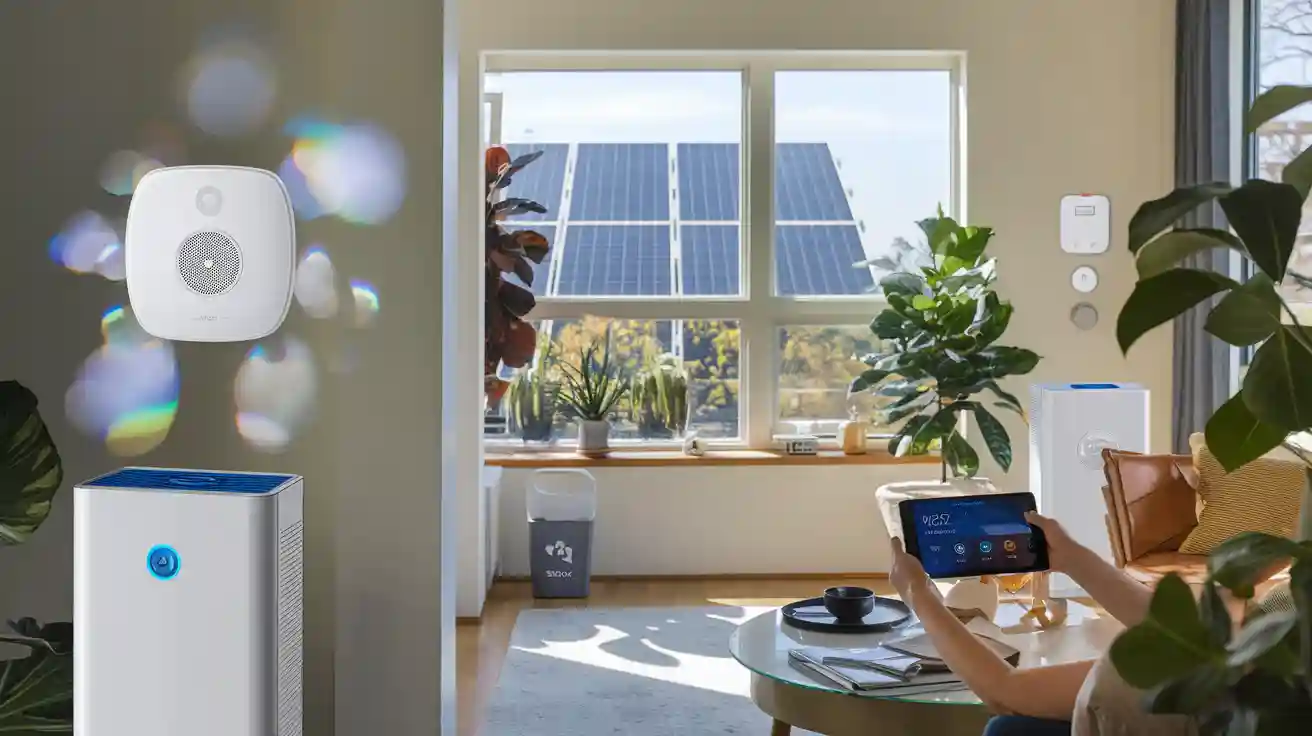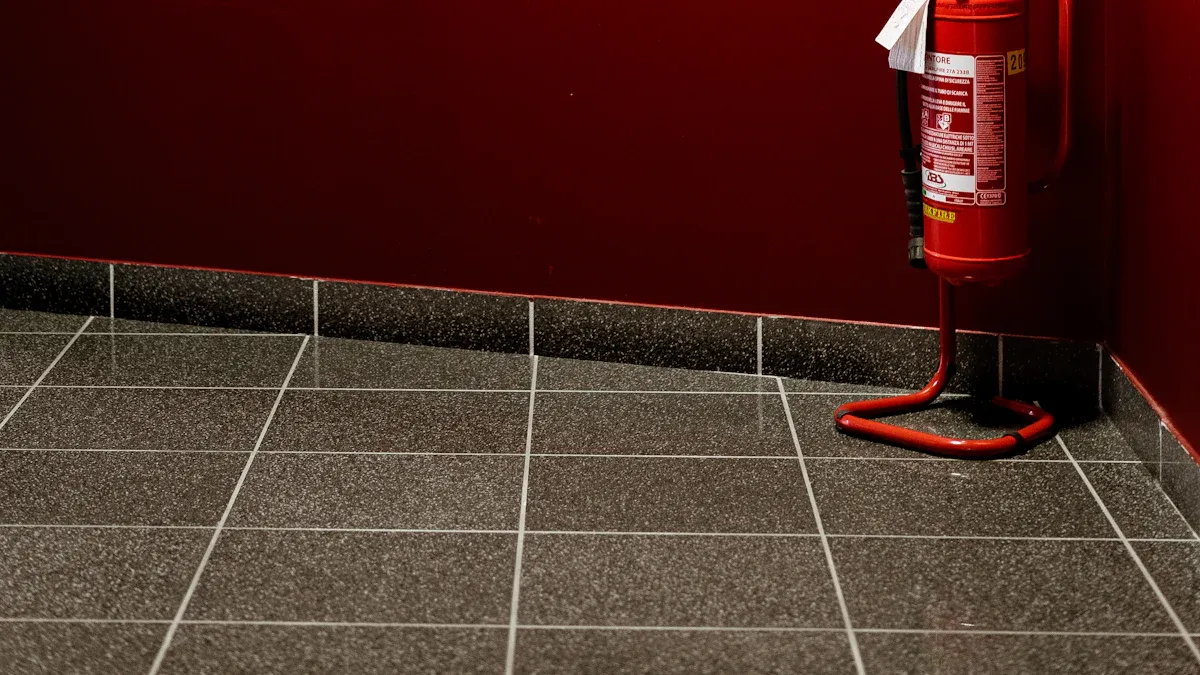Smart and Sustainable Home Maintenance Practices for 2025

Maintaining your home through regular home maintenance keeps it safe and valuable. Consistent care can raise your home's value by 1% each year. Ignoring property maintenance might lower the value by up to 10%. Small jobs like sealing cracks or fixing leaks can prevent big repairs later. Smart and eco-friendly habits in home maintenance save money and energy too. For instance, energy-saving windows lower heating and cooling needs by 20–30%. Changing HVAC filters often as part of your home maintenance routine can cut energy use by up to 15%. These actions make your home work better and feel safer and cozier.
Key Takeaways
Taking care of your home can raise its value yearly. Fix things early to avoid big repair costs.
Easy jobs like fixing cracks and cleaning gutters stop big problems. Small repairs save cash and protect your home.
Energy-saving tools like smart thermostats and special windows cut bills. They also make your home more comfy.
Checking smoke alarms and fire extinguishers often is very important. Test them every month to make sure they work.
Using green materials and habits helps the planet. It also makes your home look better and worth more.
Annual Home Maintenance Checklist
Exterior Inspection
Check siding, paint, and trim for damage.
The outside of your home protects it from weather. Check the siding, paint, and trim often for damage. Look for peeling paint, cracks, or bent areas. Fixing these problems early stops water from causing bigger issues. Adding new paint keeps your home safe and makes it look nice.
Seal cracks in the foundation, sidewalks, and driveway.
Cracks in the foundation, sidewalks, or driveway can grow worse. Use a sealant to fill them and keep water out. This simple fix keeps your home strong and prevents accidents on uneven surfaces.
Maintenance Task | Importance |
|---|---|
Stops expensive repairs and improves safety and comfort. |
Roof and Gutter Maintenance
Look for broken or missing shingles.
Taking care of your roof and gutters stops water damage. Check your roof for broken or missing shingles. Replace them quickly to stop leaks and make your roof last longer. Regular checks help avoid water problems.
Clean gutters and downspouts to stop water damage.
Clogged gutters can overflow and cause mold or damage. Clean them often, especially in fall and spring. Gutter guards can help stop clogs and keep water flowing away from your house.
Checking roofs often helps stop leaks.
Cleaning gutters stops water from causing damage.
Good gutters move water away and protect your home.
HVAC System Check
Get professional checks and change filters often.
Taking care of your HVAC system keeps it working well. Have a professional check it once a year to find problems early. Change filters often to save energy and keep air clean. Clean filters help the system work better and use less energy.
Do regular maintenance to save energy.
Regular care makes your HVAC system last longer and saves money. It also keeps your home comfy all year. Keeping it in good shape avoids big repairs and improves air quality.
Regular HVAC care makes it work better.
It uses less energy and saves money.
Good care makes HVAC systems last longer.
Maintenance Task | Importance |
|---|---|
HVAC System Inspection | Keeps it working well and avoids big repairs. |
HVAC System Filter Replacement | Makes it last longer and saves money. |
Plumbing Inspection
Fix leaky faucets and pipes to stop water damage.
Leaky faucets and pipes might seem small but cause big problems. Fix them quickly to avoid expensive repairs later. A dripping faucet can waste up to 3,000 gallons yearly. This raises your water bill for no reason. Checking your plumbing often helps find and fix leaks early. This easy task saves water and protects your home.
Tip: Use a wrench to tighten loose parts or change old washers. For harder fixes, call a plumber for help.
Check visible pipes and seal small leaks.
Look at pipes under sinks or in the basement often. Watch for rust, drips, or wet spots. Use plumber’s tape or epoxy to seal small leaks before they get worse. Regular checks catch problems early and save money on repairs. Ignoring plumbing can lead to mold or serious damage.
Statistic | Value |
|---|---|
Homeowners needing maintenance | |
Homeowners delaying repairs due to cost | 60% |
Homeowners needing plumbing replacement in 5 years | 40% |
Taking care of plumbing stops water damage and mold. Fixing problems early avoids bigger issues and saves money.
Electrical System Review
Replace damaged outlets and cords.
Broken outlets and cords are dangerous and can cause fires. Replace them right away to keep your home safe. Checking your electrical system often helps find these risks early. Fixing small problems now avoids big repair costs later. A well-kept system works better and lasts longer.
Note: Turn off the power before fixing outlets or cords to stay safe.
Add GFCI outlets in wet areas.
GFCI outlets are important in places like kitchens and bathrooms. They shut off power if there’s a problem, stopping electric shocks. Adding these outlets makes your home safer and up-to-date. Regular checks help you know where upgrades are needed.
Window and Door Checks
Look for drafts, broken seals, or gaps.
Windows and doors help keep your home energy-efficient. Check them for drafts, broken seals, or gaps often. These problems let in cold or hot air, raising energy bills. Regular checks help you fix these issues early and keep your home comfy.
Seal gaps with caulk or weather-stripping.
Caulking and weather-stripping close gaps around windows and doors. These fixes stop drafts and save energy. In cold places, sealed windows and doors keep heat inside, lowering heating costs. Fixing these problems makes your home cozier and saves money.
Tip: Use a candle or incense stick to find drafts. If the flame or smoke moves, there’s a gap to seal.
Appliance Maintenance
Keep refrigerator coils and lint traps clean.
Cleaning appliances helps them work better and last longer. Start with your fridge by cleaning its coils. Dusty coils make the fridge use more energy. Use a vacuum or brush to clean them every six months. Also, clean your dryer’s lint trap after each use. A clogged lint trap wastes energy and can cause fires. Regular cleaning keeps appliances safe and working well.
Taking care of appliances saves energy and money. Studies show good maintenance is a cheap way to improve efficiency. Ignoring care raises energy bills and repair costs. Regular upkeep makes appliances last longer and work better.
Clean washing machines and dishwashers regularly.
Washers and dishwashers need cleaning to stop odors and buildup. Run a cleaning cycle monthly with vinegar and baking soda or a special cleaner. This removes grease, soap scum, and bacteria. Clean machines use less energy and work better. Regular care keeps them in great shape and saves money over time.
Tip: Read your appliance manual for cleaning instructions to avoid damage.
Basement and Attic Care
Check for leaks, mold, and pests.
Basements and attics often have water, mold, or pest problems. Inspect these areas often to catch issues early. Water damage can be expensive to fix and harmful to health. Mold grows fast after water exposure and causes allergies or breathing issues. Regular checks help you find leaks, damp spots, or pests before they get worse.
Water damage is costly to repair.
Mold grows within a day of water exposure.
Mold and pests can harm your health.
Spotting problems early protects your home and health.
Make sure insulation is in good shape.
Good insulation in basements and attics saves energy. Look for missing, damaged, or thin insulation. Fix or replace it to keep your home warm or cool. Proper insulation lowers energy bills and makes your home more comfortable.
Lawn and Landscaping Maintenance
Trim trees and bushes to stop root problems.
Your yard adds value to your home. Trim trees and bushes often to stop roots from damaging pipes or foundations. Neat plants also make your home look better. A tidy yard protects your property and boosts curb appeal.
Fertilize grass and clear dead plants.
Fertilizing keeps your lawn green and healthy. Use the right fertilizer for your grass type. Remove weeds and dead plants to help new growth and stop pests. Studies show homes with nice landscaping sell for more money. Regular lawn care improves your home’s look and value.
Study Source | Value Increase | Description |
|---|---|---|
Virginia Tech | 5.5% - 12.7% | Landscaping boosts property value significantly. |
Previous Studies | 10% - 12% | Excellent landscaping increases home value. |
Note: Experts suggest improving curb appeal before selling your home.
Deck and Patio Care
Check for loose boards, screws, or rotting wood.
Decks and patios face weather all year, causing damage over time. Look for loose boards, sticking-out screws, or wood rot often. Walk on the deck and listen for creaks or wobbly spots. Focus on railings and steps since they get the most use. Tighten screws and replace broken boards right away to keep it safe.
Tip: Use a screwdriver to poke the wood. If it sinks in easily, the wood might be rotten and needs fixing.
Clean and seal to stop mildew.
Cleaning and sealing your deck or patio keeps it strong and nice-looking. Sweep off dirt and wash it with soap or a special cleaner. Let it dry, then add a weatherproof sealant to protect it from water and sun damage. This stops mildew and keeps your outdoor area fresh. For stone or concrete patios, use a sealant made for those materials to avoid cracks or stains.
Note: Do this once a year to make your deck and patio last longer.
Final Safety Check
Check smoke and carbon monoxide alarms.
Working alarms are key for home safety. Test smoke and carbon monoxide alarms every month to make sure they work. Press the test button and listen for the beep. If it’s weak or silent, change the batteries right away. Replace alarms older than ten years to keep them reliable.
Change batteries and check fire extinguishers.
Change alarm batteries twice a year to stay ready for emergencies. Keep fire extinguishers in easy-to-reach places like the kitchen or garage. Look at the pressure gauge to see if it’s full. If the needle isn’t in the green zone, replace or fix the extinguisher. These checks can save lives during emergencies.
Callout: A safe home is a happy home. Doing these checks helps protect your family and gives you peace of mind.
Monthly and Seasonal Maintenance Tasks
Winter (January - March)
Check and seal your home in January.
January is a good time to check for winter damage. Look at windows, doors, and walls for cracks or gaps. Seal these spots to keep cold air out and save on heating. Add weather stripping to doors and caulk around windows. These small fixes help keep your home warm and energy-efficient.
Clean and organize in February to keep pests away.
February is great for deep cleaning and organizing your home. Clear out clutter from basements and attics to remove pest hiding spots. Vacuum carpets, clean behind furniture, and wipe surfaces to get rid of dust. A clean home keeps pests away and improves air quality.
Fix paint and caulk in March to stop drafts.
March is the time to prepare for spring. Check walls for peeling paint or cracked caulk. Repaint and recaulk to stop drafts and water damage. This easy task keeps your home looking nice and well-protected.
Spring (April - June)
Get your yard ready in April for new growth.
April is the month to care for your lawn and garden. Rake leaves, clear debris, and loosen soil for healthy grass. Trim trees and bushes to help them grow and stop roots from harming your home. A neat yard makes your home look better.
Tune up the HVAC system in May to save energy.
May is the best time to check your HVAC system. Have a professional inspect it, clean coils, and clear drain lines. Replace filters to make it work better. Regular care keeps your home cool and lowers energy bills.
Wash and fix outside surfaces in June.
In June, clean your home’s exterior with a power washer. Look for damage on siding, decks, and patios, and fix them. Cleaning and repairs protect your home and make it look great.
Summer (July - September)
Inspect roof and gutters in July to avoid leaks.
July is a good time to check your roof and gutters. Look for missing shingles and clean out gutters to keep water flowing. Fixing these problems early stops leaks and protects your roof.
Add smart locks and cameras in August for safety.
August is perfect for upgrading home security. Install smart locks and cameras to watch your home anytime. These updates make your home safer and give you peace of mind.
Seal driveways and decks in September to stop damage.
In September, seal your driveway and deck to protect them. Use a weatherproof sealant to stop cracks, rot, and mildew. This keeps these areas strong and safe for a long time.
Tip: Check HVAC filters every month and clean gutters each season. These tasks keep your home running smoothly all year.
Frequency | Tasks |
|---|---|
Monthly | Check filters, Clean coils, Clear drain lines, Inspect refrigerant levels |
Seasonal (Fall/Winter) | Test heating systems, Adjust thermostats, Replace filters |
Seasonal (Spring/Summer) | Inspect cooling systems, Clean coils, Clear condensate drains |
Fall (October - December)
Get your home ready for winter in October.
October is a good time to prepare for cold weather. Cover exposed pipes with foam or heat tape to stop freezing. Look for gaps around windows, doors, and walls. Seal these gaps with caulk or weather-stripping to keep heat inside. This helps lower heating bills and keeps your home warm. Check your attic and basement for drafts too. Adding insulation in these areas saves energy during winter.
Tip: Shine a flashlight in dark spots to find gaps. If light shows, seal them.
Check safety devices in November to stay prepared.
November is the month to focus on safety checks. Test smoke and carbon monoxide alarms to make sure they work. Press the test button and change batteries if needed. Look at fire extinguishers and replace them if expired. Go over your family’s emergency plan and update it if needed. These small steps help keep your family safe during emergencies.
Callout: Working smoke alarms cut fire death risks by half. Testing them saves lives.
Clean carpets and furniture in December for better air.
December is a great time to deep clean your home. Dust and dirt in carpets and furniture can hurt air quality. Use a vacuum with a HEPA filter for regular cleaning. For a deeper clean, rent a steam cleaner or hire experts. Focus on areas with lots of foot traffic and furniture. Clean carpets and furniture make your home fresher and ready for holiday visitors.
Note: Sprinkle baking soda on carpets before vacuuming to remove smells naturally.
Sustainable and Smart Practices

Smart Technology
Use smart thermostats and leak detectors for instant updates.
Smart tools make home care simple and efficient. Smart thermostats help control indoor temperatures easily. They also save energy by 10-15% with automated settings. Leak detectors warn you right away about plumbing problems. This helps stop water damage and saves money. These devices keep your home safe and lower repair costs.
Evidence Description | Findings |
|---|---|
Smart thermostats adjust heating and cooling schedules. | Cut energy use by 10-15%. |
Leak detectors notify you of plumbing issues quickly. | Avoids costly water damage. |
Combine devices into one app for easier control.
Managing many smart devices can be tricky. Using one app to control them makes it simple. You can adjust settings, track energy use, and get alerts in one place. This setup saves time and improves energy efficiency. For example, you can change the thermostat or check for leaks from your phone.
Energy Efficiency
Install energy-saving windows and seal air leaks.
Energy-efficient windows cut heating and cooling needs by 30%. Sealing gaps around windows and doors stops drafts and keeps your home cozy. These changes save energy and lower bills. Small habits, like turning off lights, also help save money.
Tip: Changing HVAC settings by a few degrees saves energy over time.
Replace old appliances with energy-efficient ones.
Older appliances waste energy. Switching to energy-saving models, like Energy Star ones, reduces energy use by 30%. In 2023, families in the U.S. saved $8.4 billion with clean energy. Upgrading appliances can save households about $450 each year.

Sustainability
Choose eco-friendly materials and habits.
Eco-friendly materials lower your home's impact on the planet. Bamboo flooring and recycled insulation are great choices. They last longer and create a healthier home. Green habits like composting and collecting rainwater also help the environment.
Use solar panels for renewable energy.
Solar panels are a smart long-term choice. They cost a lot upfront but save families about $2,230 yearly. Solar energy also lowers your home's carbon footprint. Over time, these systems pay for themselves and make your home greener.
Callout: Homes use a lot of energy. Switching to solar power cuts greenhouse gas emissions.
Safety and Security Measures

Safety Equipment
Check and update smoke and carbon monoxide detectors.
Smoke and carbon monoxide detectors keep your home safe. Test them every month by pressing the test button. Change the batteries twice a year, even if they still work. Replace detectors older than ten years with new ones. New models often have long-lasting batteries or smart features. These can send alerts to your phone for added safety. Upgrading detectors lowers risks and keeps your family safer.
Tip: Use your phone to set reminders for testing and battery changes.
Keep fire extinguishers ready and easy to find.
Fire extinguishers help stop small fires before they spread. Place them in important spots like the kitchen, garage, and near doors. Check the pressure gauge every month to see if it’s full. If the needle isn’t in the green zone, replace or fix it right away. Teach everyone in your home how to use them. A working extinguisher can make a big difference in an emergency.
Callout: Good safety tools lower fire risks and might save you money on insurance.
Home Security
Add smart locks and cameras for better protection.
Smart locks and cameras make your home safer. Smart locks let you lock or unlock doors from your phone. Cameras let you watch your home live, scaring off intruders. These systems help prevent break-ins and keep your home secure. Homes with security systems may also get lower insurance costs.
Stops Break-Ins: Security systems scare off burglars and reduce thefts.
Better Fire Safety: Systems with detectors can qualify for discounts.
Quick Emergency Alerts: Alerts help reduce damage during emergencies.
Check doors, windows, and outdoor lights often.
Look at your doors, windows, and outdoor lights regularly. Fix weak locks, broken frames, or gaps quickly. Outdoor lights are important too. Motion-sensor lights can scare away intruders and brighten dark areas. Regular checks keep your home safe and secure.
Benefit | Explanation |
|---|---|
Stops Break-Ins | Security systems scare burglars, lowering risks for insurance. |
Better Fire Safety | Smoke detector systems reduce fire risks and may save money. |
Quick Emergency Alerts | Alerts help emergency services respond faster, reducing damage. |
Note: Keeping your security system in good shape protects your home and gives peace of mind.
Taking care of your home is very important. It keeps your house safe and its value high. Fixing small problems early stops big, expensive repairs later. Using smart and eco-friendly ideas, like energy-saving appliances or solar panels, saves money and makes your home more appealing.
Regular care can raise a home's value by 1% each year.
Green features save money and make homes worth more.
Homes with solar power are more popular, says the National Renewable Energy Laboratory.
Doing these things keeps your home cozy, efficient, and valuable. Start now to have a well-kept and eco-friendly home by 2025.
FAQ
How should I start taking care of my home?
Use a checklist to begin. Look at important areas like the roof, plumbing, and HVAC system. Fix small problems quickly to avoid bigger ones. Regular care keeps your home safe and working well.
How often do gutters need cleaning?
Clean gutters two times a year, in spring and fall. This stops clogs and water damage. If you have many trees nearby, clean them more often.
Are smart home gadgets a good idea?
Yes, smart gadgets like thermostats and leak detectors save energy and cut repair costs. They give instant alerts and make home care easier. Over time, they pay for themselves.
How can I save energy at home?
Seal gaps around windows and doors. Get energy-saving appliances and use smart thermostats. These changes lower bills and make your home more comfortable. Small steps can help a lot.
Why is regular home care important?
Regular care stops expensive repairs, keeps your home safe, and raises its value. It also makes your home comfy and energy-efficient. A well-cared-for home is easier to enjoy and manage.
See Also
Emerging Practices for Sustainable and Durable Home Building
Innovative Developments in Residential Security Systems for 2025
Essential Pool Care Strategies to Follow in 2025
Why Regular Hot Tub Maintenance Matters in 2025
Cutting-edge Roofing Innovations for Contemporary Residences
